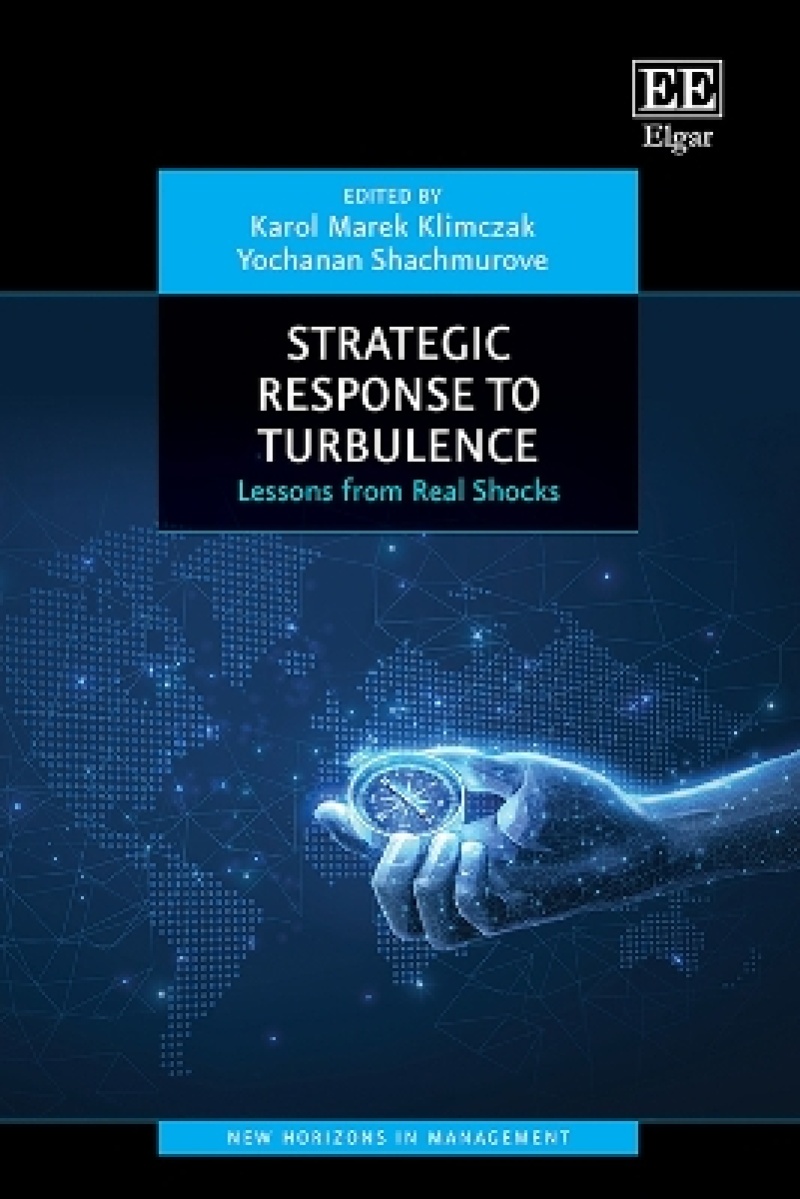<i>‘Thinking about and implementing strategic change has probably never been more crucial for organizations than it is today. Focusing on responses to volatility and turbulence, this book offers a set of applied frameworks and fascinating examples that can help managers and scholars alike conceptualize and make more informed decisions as they navigate increasingly complex environments.’</i>
- Tomasz Obloj, Associate Professor, Weimer Faculty Fellow, Indiana University, USA,
<i>‘</i>Strategic Response to Turbulence: Lessons from Real Shocks<i> offers a profound exploration of how businesses can adapt to global disruptions. The Polish Karol Klimczak and the American Yochanan Shachmurove scholars present, co-edit a wealth of empirical research and practical strategies that illuminate the pathways to resilience and innovation in the face of economic shocks. It bridges the gap between theoretical insights and practical applications in how consumer behavior shapes industry dynamics.</i>
The book consists of professional analyses of different nations, as exemplified in the examination of Polish consumers driving the green energy transition. This research underscores how understanding local consumer behavior can significantly influence industry strategies in the face of environmental and economic challenges. The book draws from topics in the areas of international economic relations, banking, risk management in financial markets, and capital markets. I highly recommend this book to scholars, students, policy makers, and business leaders seeking to examine the local economy and thrive in an increasingly unpredictable, turbulent world.’
- Alojzy Zbigniew Nowak, Rector, University of Warsaw, Poland,
<i>‘The book </i>Strategic Response to Turbulence: Lessons from Real Shocks <i>co-edited by Karol M. Klimczak and Yochanan Shachmurove is a seminal work that catalogues strategic responses of a diverse range of industries across the globe to recent economic shocks and upheavals. It offers a comprehensive and inclusive analysis that spans multiple sectors and geographical regions, providing a rich tapestry of insights that are both practical and theoretically profound.</i><p></p>
In concrete settings, the editors and the contributors study how businesses worldwide have adapted their strategies in response to recent disruptions like pandemics, economic fluctuations, and geopolitical upheavals. The international scope of the book is commendable. It incorporates case studies from North Africa, Europe, Africa, and Asia, each contributing unique perspectives on managing strategic changes and fostering resilience. This global viewpoint is crucial for understanding the interconnected nature of modern economies and the widespread impacts of global shocks. I recommend this book to researchers, policy makers, executives at all levels of the organization, and students looking for a comprehensive resource on strategic management and innovation.’
- Jerzy Boehlke, Faculty of Management, Dean, Nicolaus Copernicus University, Torun, Poland,
<i>‘There are three reasons why you should read this book. Firstly, it is truly international in scope. Secondly, it offers real insight into the two key issues that all organisations face – volatility and turbulence. Lastly, it provides managers with sound advice, and students with a real understanding of the challenges organisations face and how they can be addressed.’</i>
- Bernard Burnes, Professor Emeritus, Chair of Organisational Change, Stirling Management School, University of Stirling, UK,
<i>‘Whether due to the challenges of new technologies or the climate crisis, in developed or emerging markets, large or small firms – we are all challenged to ride a wild wave of rapid and discontinuous change. This book provides rich insights about how to do that by documenting and reflecting on a range of cases.’</i>
- Helena Barnard, Academic Head: Doctoral Programmes, Gordon Institute of Business Science, University of Pretoria, South Africa,
<i>‘</i>Strategic Response to Turbulence: Lessons from Real Shocks<i> provides a vital and insightful examination of the challenges and opportunities of managing strategic change in volatile times. Klimczak and Shachmurove have assembled a remarkable collection of contributions examining a range of exciting cases, offering valuable insight into how firms can navigate future crises. This book is highly relevant for scholars, students, and practitioners interested in strategic change.’</i>
- Marcus M. Larsen, Professor, Copenhagen Business School, Denmark,
<i>‘Whether due to the challenges of new technologies or the climate crisis, in developed or emerging markets, large or small firms – we are all challenged to ride a wild wave of rapid and discontinuous change. This book provides rich insights about how to do that by documenting and reflecting on a range of cases.’</i>
- Helena Barnard, Academic Head: Doctoral Programmes, Gordon Institute of Business Science, University of Pretoria, South Africa,
<i>‘The book </i>Strategic Response to Turbulence: Lessons from Real Shocks<i>, co-edited by Karol Klimczak and my former student, Yochanan Shachmurove, focuses on how companies adapt their strategies to global disruption. The book stresses the need for flexible and forward-looking approaches to managing unpredictable economic environments.</i>
In the book, the editors examine strategic responses to both acute and chronic crises, including economic disruptions following geopolitical events as well as responses to climate change and energy volatility. The book details management decisions and strategic adaptations to external threats, emphasizing the need for effective policy responses. Importantly, the authors emphasize the role of strategic planning, constructing an array of possible eventualities based on forming rules rather than ad hoc discretion. I highly recommend this book to researchers, academicians, policy makers, and chief executive officers interested in coherent responses to market dynamics and turbulence.'
- Nobel Laureate Finn Kydland, Jeffrey Henley Professor of Economics, Distinguished Professor of Economics, University of California, Santa Barbara USA,
Drawing on novel empirical research and nuanced methodologies, this book provides actionable strategies for overcoming future crises. Chapters represent a broad range of core industries, such as education, Information and Communications Technology (ICT), energy and real estate. They explore how a wide variety of companies deal with shifting client consumption patterns, supply chain fractures and government restrictions. Strategic Response to Turbulence is an essential navigational tool to enhance competitive advantages of firms operating in turbulent environments.
Assessing case studies from a broad range of geographical locations, this book is useful for students and scholars of geography, management, entrepreneurship, leadership and organisational behaviour. It is beneficial for those working in leadership positions seeking to understand how to overcome unforeseen challenges in different industries.
